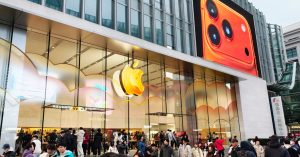Chinese EV battery maker Gotion has picked Illinois as the site of a new $2 billion EV lithium battery plant in the United States, the Midwestern state’s governor JB Pritzker announced with Gotion on Friday.
The facility is the latest Chinese green energy-related project in the U.S., and counters an overall downturn in Chinese investments amid geopolitical strains between the two countries. Annual foreign direct investment from China into the U.S. has dropped from $46 billion in 2016 to less than $5 billion in 2022, according to a report on Thursday by the Rhodium Group. “In the past seven years, China has gone from one of the top five U.S. investors to a second-tier player surpassed by countries such as Qatar, Spain, and Norway,” it said.
The project to be located in Manteno is “the most significant new manufacturing investment in Illinois in decades,” Pritzker said in a press release. The site will cover about 150 acres; 2,600 new jobs are to be created, and production is expected to start next year, the announcement said.
Gotion’s investment will be supported by a “Reimagining Energy and Vehicles” incentive package, a new “Invest in Illinois” fund, and “other incentives” worth a total of $536 million, the statement said. Gotion’s will be the first recipient of Invest in Illinois funding following its creation in early 2023 to make Illinois more attractive when vying for large projects in highly competitive sectors like clean energy, the statement said. Gotion was further approved by local authorities for property tax abatement for 30 years.
“As part of Illinois’ commitment to build out comprehensive EV hubs and support Illinois’ workforce, the state will also fund a new manufacturing training academy nearby, as well as award an additional grant to workforce providers to expand training and prepare regional employees for the new jobs,” the statement said.
The announcement comes at a time when Illinois has been ranked as a state with among the highest rates of net outward migration and negative population growth. (See related post here.)
Gotion, headquartered in the eastern Chinese city of Hefei, is about 25% owned by Volkswagen, according to an August filing. Chairman Li Zhen and his son own about 7.4% of the company. Li had a fortune worth $1.2 billion on the 2023 Forbes Billionaires List published in April.
“All that we see here [in Illinois] are of enormous value to us: an enabling business environment, a supportive state government for the new energy industry and their highly efficient work, as well as the prospects of the State of Illinois in the coming years,” Li said in the statement.
“When we come to Illinois, we are not building a new factory but are planning to reuse an existing one and bring it back to life again as our way of cherishing and conserving resources. We believe that Gotion’s battery technology will help to boost e-mobility in North America and the economic and trade exchanges between China and the U.S.”
Gotin’s revenue rose by 76.4% in the first half of 2023 to 15.2 billion yuan, or about $1.4 billion; net profit gained by 223% to 209 million yuan. However, its Shenzhen-traded shares have lost 31% in the past year amid tough price competition in the EV market.
Speaking at the U.S.-China Business Forum in New York on Aug. 29, Tu Le, the founder of Detroit-based auto consultancy Sino Auto Insights, said partnering between U.S. and Chinese auto industry companies that’s been controversial is nevertheless likely to advance. “It’s a little more complicated now” because of the geopolitical environment and Congressional passage of the Inflation Reduction Act, which includes incentives for onshoring, Le said.
However, the economics favor working together, he said. “If the US automakers are going to build profitable (electric) vehicles below a $50,000 price point, then they’re going need Chinese batteries,” Le said. “We don’t have the capacity. We don’t have the mining, we don’t have the refining, and we won’t have it in significant volumes through this decade,” he said. (See related post here.)
Among U.S. companies working with Chinese battery partners, Tesla and Ford partner with CATL; GM works with joint venture partner SAIC.
See related posts:
Consolidation, U.S. Partnerships Lie Ahead For China’s EV Makers — Sino Auto’s Tu Le
Why China Still Beckons For Some Globally Minded Foreign Businesses
China Ambassador To U.S. Xie Feng Calls For New Path Forward In Ties At Forum
Businesses Have Role In Helping “Terrible” U.S.-China Ties: Former U.S. Ambassador To China Max Baucus
@rflannerychina
Read the full article here







